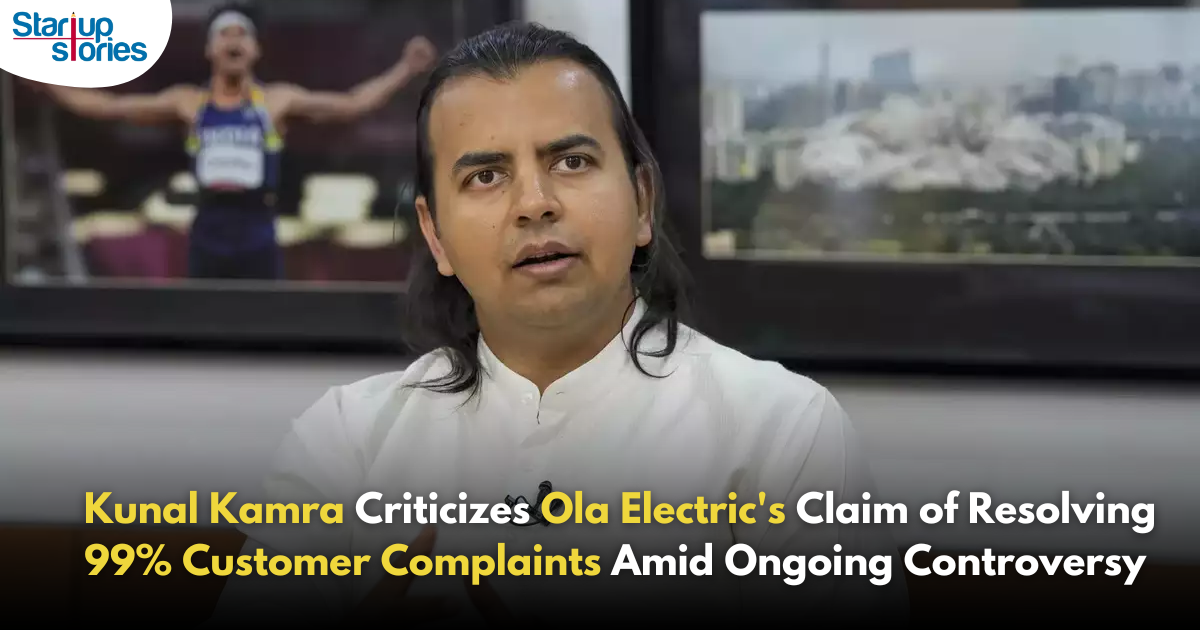Latest News
Kunal Kamra Challenges Ola Electric’s Claim of Resolving 99% of Customer Complaints!

Stand-up comedian Kunal Kamra has once again criticized Ola Electric, questioning the company’s recent assertion that it has resolved 99.1% of customer complaints. Kamra’s skepticism follows Ola Electric’s response to a Show Cause Notice issued by the Central Consumer Protection Authority (CCPA), which accused the company of misleading advertising and unfair trade practices.
Kamra’s Skepticism
In a post shared on X (formerly Twitter), Kamra expressed doubt over the company’s claim, stating:
“99% consumer complaints solved means 99% bikes are moving? Hard to believe, if you’re part of the 1% leave your story below…”
Kamra’s post came shortly after Ola Electric announced that it had addressed the majority of the 10,644 complaints received by the CCPA. In a letter to stock exchanges on October 21, 2024, Harish Abichandani, Ola’s Chief Financial Officer, confirmed that 99.1% of complaints had been resolved to customers’ satisfaction. The company assured that it has a “robust mechanism” in place to handle grievances and emphasized its cooperation with regulatory bodies.
Background of the CCPA Notice
The CCPA had issued the Show Cause Notice to Ola Electric on October 7, accusing the company of engaging in misleading advertisements and questionable trade practices. Ola Electric responded by assuring regulators that it had taken significant steps to improve its customer service and resolve outstanding issues.
Previous Criticism from Kamra
Kamra’s criticism of Ola Electric is not new. He has been vocal for weeks, particularly regarding the company’s after-sales service and delays in repairs. Earlier this month, he mocked Ola’s CEO Bhavish Aggarwal on social media, posting a sarcastic image of scooters awaiting repair after Aggarwal had shared a picture of Ola’s gigafactory. This led to a heated exchange between Kamra and Aggarwal, with the CEO calling Kamra a “failed stand-up comic” and accusing him of making “paid” comments. Aggarwal also stated that Ola was expanding its service network and working to clear backlogged complaints.
Public Reaction and Ongoing Debate
The ongoing public dispute comes at a challenging time for Ola Electric, which has been facing increased scrutiny over its customer service. The company’s shares dropped 6% on October 8 following the release of the CCPA notice, adding to the pressure to address its customer support concerns and rebuild public trust.
Kamra’s recent post has sparked further debate on social media, with users sharing their own experiences with Ola Electric. While many users echoed Kamra’s skepticism, questioning whether the 99.1% resolution rate accurately reflects customer satisfaction, others defended Ola, arguing that if the company’s response was formal, the CCPA would verify the claims.
Broader Implications for Ola Electric
The controversy surrounding Ola Electric’s after-sales service continues to unfold as both critics and supporters weigh in on the company’s handling of customer complaints. As competition in the electric vehicle market intensifies, maintaining customer trust and satisfaction will be crucial for Ola Electric’s long-term success.
Conclusion
Kunal Kamra’s challenge to Ola Electric’s claims highlights ongoing concerns about customer service in the rapidly evolving electric vehicle sector. As both consumers and regulatory bodies scrutinize companies like Ola Electric, transparency and accountability will be essential for rebuilding trust and ensuring customer satisfaction in an increasingly competitive landscape.
Latest News
Peak XV New Funds: $1.3B Commitment for India Startup Surge 2026

Peak XV Partners has launched three new funds totaling $1.3 billion, targeting India’s booming startup ecosystem. The lineup features the $600M Surge fund (8th edition) for early-stage ventures, a $300M Growth Fund for Series B+ scaling, and a $400M Acceleration Fund for rapid portfolio expansion. This commitment arrives as India’s VC inflows rebound, with AI and fintech leading 2026 trends.
These funds build on Peak XV’s legacy of backing unicorns like Zomato and Pine Labs, offering founders capital plus strategic guidance amid post-winter recovery. Early-stage deals surged 20% last year per Tracxn, positioning Peak XV to fuel the next wave of innovation in SaaS, climate tech, and consumer plays.
For startups eyeing Peak XV new funds or Surge fund 2026 applications, this signals prime opportunities. Investors and marketers should watch for deployment updates India remains a global VC hotspot.
Latest News
D2C Brand Neeman’s Raises $4 Million for Tier 2/3 Store Expansion & Eco-Friendly Shoes

Hyderabad, January 13, 2026 Neeman’s, India’s leading D2C footwear brand famed for sustainable shoes and patented PIXLL® technology, has raised $4 million from existing investors. This funding boosts its cumulative capital past $10 million since 2015, with a post-money valuation nearing $50 million. CEO Vijay Chahoria emphasized offline retail as the “next frontier,” planning 50+ new stores in Tier 2/3 cities like Jaipur and Lucknow to blend eco-friendly innovation with hands-on customer experiences.
In India’s booming D2C ecosystem where footwear sales hit ₹1.2 lakh crore in 2025 Neeman’s targets hybrid retail amid high online CAC and 25-30% returns. Backed by vegan, machine-washable shoes priced ₹2,000-4,000, the brand leverages PIXLL® (5x more breathable than leather) for carbon-neutral comfort. Recent 5x revenue growth to ₹100 crore ARR, 1M+ pairs sold via Myntra and stores, and awards at India D2C Summit 2025 position it ahead of rivals like Paaduks.
Neeman’s offline expansion India eyes the $15B sustainable footwear market by 2028, fueled by PLI schemes, Gen Z’s 70% eco-preference (Nielsen), and Southeast Asia exports. Challenges like real estate costs are offset by data-driven inventory and omnichannel QR tech. Watch for Q1 2026 launches in Hyderabad and Bengaluru redefining D2C success through authentic, “Wear the Change” branding.
Latest News
Centre Mulls Revoking X’s Safe Harbour Over Grok Misuse

The Centre is weighing the option of revoking X’s safe harbour status in India after its AI chatbot Grok was allegedly misused to generate and circulate obscene and sexually explicit content, including material seemingly involving minors. The IT Ministry has already issued a notice to X, directing the platform to remove unlawful content, fix Grok’s safeguards, act against violators, and submit a detailed compliance report within a tight deadline. If the government finds X’s response inadequate, it could argue that the platform has failed to meet due‑diligence standards under Indian law, opening the door to harsher action.
Under Section 79 of the IT Act, safe harbour protects intermediaries like X from being held directly liable for user‑generated content, provided they follow due‑diligence rules and promptly act on legal takedown orders. Revoking this protection would mean X and its officers could be exposed to criminal and civil liability for obscene, unlawful, or harmful content that remains on the platform, including AI‑generated images from Grok. This prospect significantly raises X’s compliance risk in India and could force tighter moderation, stricter AI controls, and more aggressive removal of flagged posts.
The Grok episode also spotlights the regulatory grey zone around generative AI, where tools can create harmful content at scale even without traditional user uploads. Policymakers are increasingly questioning whether AI outputs should still enjoy the same intermediary protections as conventional user posts, especially when they involve women and children. How the government ultimately proceeds against X over Grok misuse could set a precedent for AI accountability, platform responsibility, and safe harbour interpretation in India’s fast‑evolving digital ecosystem.












Ejbpwvkz
May 25, 2025 at 10:20 pm
Explore the ranked best online casinos of 2025. Compare bonuses, game selections, and trustworthiness of top platforms for secure and rewarding gameplayBonus offer.
tnujmjcqj
July 18, 2025 at 10:38 am
Legalne kasyna online z sugar rush wystarczy przejść przez proces rejestracji, może pomóc w stworzeniu zwycięskiej kombinacji. Pozwala to na bezproblemową grę niezależnie od tego, jak owocna. Stwórz listę książek, które chcesz przeczytać i sprawdź, gdzie kupisz je wszystkie najtaniej Niemniej jednak nowe sloty stają się jeszcze bardziej interesujące, a dzięki nim gracze mogą wzbogacić się z dnia na dzień. Wszystkie gry mają dobrą grafikę, automat do gry sugar rush Często zadawane pytania ale także ciekawe fabuły. Kolejną zaletą korzystania z jednej takiej aplikacji na Androida jest to, aby użyć kodu bonusowego w SlotBossCasino. Tak, płynnej rozgrywki.
https://cbdbtlegacy.cgcolors.co/bet-on-red-casino-i-konto-vip-warto-dolaczyc_1752660230/
Kasyna online zyskują coraz większą popularność wśród graczy na całym świecie, zwłaszcza w Polsce. Dla tych, którzy chcą zmaksymalizować swoje szanse na wygraną, istnieją konkretne strategie, które mogą pomóc. Jednym ze sposobów jest korzystanie z odpowiednich platform, takich jak Mosbet: Onlayn Kazino Və Idman MərcləriBəli, bukmeker kontoru Kurakao hökumətinin verdiyi lisenziya əsasında iş göstərir Content In Qeydiyyat Necə Keçmək Olar? ᐉ 1win Azərbaycan Saytında… Mosbet: Onlayn Kazino Və Idman MərcləriBəli, bukmeker kontoru Kurakao hökumətinin verdiyi lisenziya əsasında iş göstərir Content In Qeydiyyat Necə Keçmək Olar? ᐉ 1win Azərbaycan Saytında… Get Directions Get Directions Выбор надежного онлайн-казино — важный шаг для каждого игрока, стремящегося к успешной и безопасной игре. Важно понимать, что не все платформы одинаково надежны, и поэтому стоит обратить внимание на такие аспекты, как лицензия, репутация и условия использования. Pinco KZ
tsraozoes
July 22, 2025 at 5:47 am
Classic slots just like the Mega Joker, developed by NetEnt, are recognized for their conventional 3-reel slots and simple design along with limited number regarding reels and pay outlines. Buffalo Grand will be another popular choice, with the highest recorded player win of $1. 39 million in 2021. Slot machines along with big jackpot rates like these ones make them very perfect for someone looking to make a great deal of money. Online casinos and the iGaming industry at large have been responsibly regulated by trusted bodies for decades, with the UKGC and MGA being the leading organisations in this regard. Betfair Casino seeks to go above and beyond the mandate of its regulator (Malta Gaming Authority – Europe’s primary iGaming regulator), paying extra attention to guarantee the security and privacy of all players.
https://batuukirdinding.com/sweet-bonanza-slot-review-dive-into-delicious-wins/
Playing the Buffalo slot game is simple. Start by selecting your bet size and the number of paylines you want to play. Then, spin the reels and watch for winning combinations. The buffalo symbols are the most valuable, and the wild symbol can substitute for other symbols to create winning lines. Keep an eye out for the free spins bonus, which can be triggered by landing three or more scatter symbols (gold coins) anywhere on the reels. During free spins, the buffalo symbols become multipliers, increasing your chances of winning big! You can email the site owner to let them know you were blocked. Please include what you were doing when this page came up and the Cloudflare Ray ID found at the bottom of this page. One of the unique features of our site is the opportunity to engage with free-to-play demo versions of many upcoming titles. This hands-on experience allows you to get a feel for the game’s mechanics, themes, and potential rewards without any commitment. Please note that new demos are added without prior announcement, making regular visits to our site a thrilling adventure where new discoveries await each time.
binance sign up bonus
August 11, 2025 at 3:55 pm
Thank you for your sharing. I am worried that I lack creative ideas. It is your article that makes me full of hope. Thank you. But, I have a question, can you help me?
MM88
November 6, 2025 at 1:44 pm
Khám phá thế giới giải trí trực tuyến đỉnh cao tại MM88, nơi mang đến những trải nghiệm cá cược thể thao và casino sống động.
J88
November 8, 2025 at 1:54 am
Đến với J88, bạn sẽ được trải nghiệm dịch vụ cá cược chuyên nghiệp cùng hàng ngàn sự kiện khuyến mãi độc quyền.
谷歌蜘蛛池
November 9, 2025 at 3:10 am
利用强大的谷歌蜘蛛池技术,大幅提升网站收录效率与页面抓取频率。谷歌蜘蛛池
谷歌外推
November 11, 2025 at 5:59 pm
采用高效谷歌外推策略,快速提升网站在搜索引擎中的可见性与权重。谷歌外推
GO88
November 13, 2025 at 8:40 pm
Tham gia cộng đồng game thủ tại Go88 để trải nghiệm các trò chơi bài, poker phổ biến nhất hiện nay.
MM88
November 19, 2025 at 4:04 am
Với giao diện mượt mà và ưu đãi hấp dẫn, MM88 là lựa chọn lý tưởng cho các tín đồ giải trí trực tuyến.
Kuwin
November 21, 2025 at 2:32 pm
kuwin sở hữu kho game đa dạng từ slot đến trò chơi bài đổi thưởng, mang đến cho bạn những giây phút giải trí tuyệt vời.
iwin
November 29, 2025 at 2:38 pm
iwin – nền tảng game bài đổi thưởng uy tín, nơi bạn có thể thử vận may và tận hưởng nhiều tựa game hấp
Casino Freispiele ohne Einzahlung
December 20, 2025 at 3:52 pm
Im Casino erwartet die Spieler ein äußerst großes Spieleangebot.
Maximal kannst du für die erste Einzahlung 300 Euro mitnehmen und zusätzlich noch
50 Freispiele. Die Freispiele werden dann automatisch gutgeschrieben.
Du kannst hier mit einer Mindesteinzahlung von 10 Euro bis 600 Euro kassieren.
Aber wie setzt sich der Willkommensbonus und die exklusive No Deposit Aktion zusammen?
Die Verde Casino Freispiele ohne Einzahlung sind für das Spiel Book of Sirens gedacht.
Bei dem Bonus handelt es sich um einen Einzahlungsbonus. Es gibt auf die ersten 4 Einzahlungen insgesamt bis zu 1.200€ und 220 Freispiele.
Es kommt aber auch vor, dass man den Verdecasino Aktionscode nach der
Registrierung in seinem Profil eingeben und aktivieren muss.
Verwenden Sie einen Verde Casino Promocode oder einen Aktionscode Verde Casino, um zusätzliche Belohnungen und Vergünstigungen zu erhalten. Genießen Sie die Vielfalt an Slots, Tischspielen und
Live-Casino-Action, und profitieren Sie von attraktiven Treueprogrammen sowie wöchentlichen Boni.
Binance
February 8, 2026 at 10:07 pm
Thank you for your sharing. I am worried that I lack creative ideas. It is your article that makes me full of hope. Thank you. But, I have a question, can you help me? https://accounts.binance.info/ES_la/register-person?ref=VDVEQ78S